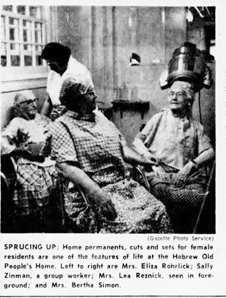by Reinier Heinsman
My grandmother, Lucienne Raap-Blumenthal (1937 Antwerp – 2013 Apeldoorn), was born in Belgium of Hungarian descent. Her parents left their Hungarian birth towns in the 1920s, and they met in Antwerp, where my grandmother Lucienne was born. Her maternal grandfather (my great-great grandfather), Ferdinand Nachman Jakab, was born in 1892 in Diós, a village northwest of Cluj, in Romania. When he was born, the region was still Hungarian, and the Jakab family considered themselves a Hungarian Jewish family. Ferdinand Jakab moved to Cluj when he was still young. From there, he moved with his household to Antwerp in 1927.
Ferdinand Jakab was a master tailor. He had his own tailor shop in Antwerp where he made elegant suits for men. He enjoyed the little things, such as going for a walk in the park of Antwerp to admire his favorite tree, a weeping willow. Ferdinand was also a writer, who especially liked to write Hungarian poems. In September 1942, he was deported from Belgium to Auschwitz. He was selected for slave labor and survived for two years in the camp until he was tortured to death in October 1944, which was testified after the war by two former Auschwitz prisoners. Due to his death, and because of the silence after the war of his surviving wife, our family barely knew anything about his origins — only that his parents were called Isaac Jakab and Rosalia Lustig. But did Ferdinand have, for instance, any siblings? Nothing about it was known. Eventually, when I started the search for more information in the summer of 2018, I used JewishGen as a starting point.
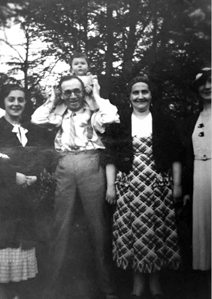
1935 Antwerp
I searched for people with the last name Jakab, who came from the region of Romania. To my surprise, on JewishGen I found an entry for a marriage of a person called David Jakab, whose parents shared the same names as the parents of my great-great-grandfather Ferdinand Jakab. David was also born in Diós, the same village where Ferdinand was born. They were definitely brothers. After a long search, I discovered one more brother, Samuel, and a sister, Bertha, in the Immigration Archives of the city of Antwerp. This meant that they both went to Belgium as well, just as Ferdinand himself. Later, I discovered a birth and a death record for another sister, Gizella, on Ancestry.com. Gizella died at age seven in Cluj, so the search was narrowed to Bertha, Samuel, and David, siblings of Ferdinand Jakab.
While Bertha, Samuel, and Ferdinand were all found in the Antwerp Immigration Archives, only Ferdinand’s side of the family stayed in Antwerp. The archives showed that Bertha and Samuel’s sides eventually moved to Brussels. But where was David Jakab, the other sibling? I searched on JewishGen for clues. The entry in JewishGen about David mentioned that in 1907, in Cluj, he married Roza Goldner, daughter of Lev Goldner and Sali Albert.
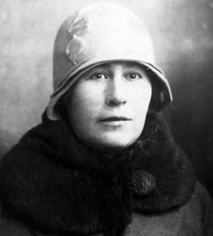
In November 2018, I sent a message to a person through JewishGen’s Family Finder who was listed as a researcher of the Goldner family in Cluj. I received no response. Months went by without finding new information about David. A few months into 2019, I was contacted by Miki Goldner, the person who I had approached earlier through the Family Finder. “I found your e-mail in my spam file,” he said. Apparently, something went wrong when I sent my e-mail, but fortunately he was still able to find it months later.
Miki, a descendant of a first cousin of Roza Goldner, told me on the phone about the Goldner family. When he shared an old family tree of that family, it became clear that David Jakab and Roza Goldner had two children: Irene and Margit. No additional information was given on the tree besides their names. In the database of Yad Vashem, I saw that Irene Jakab was deported from Romania to Auschwitz. I found no mention of her parents, David and Roza, or her sister, Margit.
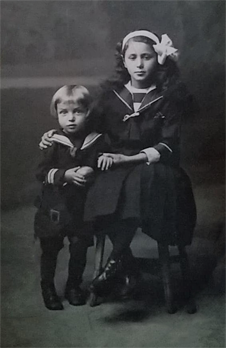
Cluj, c. 1915
I decided to contact a person who was mentioned on the family tree that was shared with me by Miki. That person was a descendant of a sister of Roza Goldner. I received another old family tree, which mentioned the name of Adrian Ovidiu Moțiu, the only grandchild of David Jakab! Adrian was easily found. He became a well-known Romanian politician in the 1990s. Sadly, he passed away in 2004.
Thanks to the second old family tree, I learned about the two children of Adrian as well: Ovidiu and Ioana. Both of them had already passed away, Ioana most recently in August 2018, which meant that I was a few months too late. Thanks to a friend of Ioana, who I located on Ioana’s still active Facebook page, I came into contact with Iuliu, Ioana’s son, the only living descendant of David Jakab. Thanks to him, all the pieces fell into place. I received several photos, among them a photo of David Jakab in Cluj before the war.
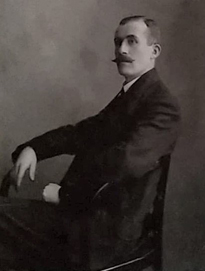
From Iuliu, I learned that David Jakab was murdered in the Shoah. He was sent to the ghetto of Cluj before being deported to Auschwitz, where he and his wife Roza Goldner were sent to the gas chambers upon their arrival in June 1944. One of their daughters, Irene, survived Auschwitz, and went back to Cluj. She never married and had no children. Their other daughter, Margit, was never deported. She was in hiding with her husband and son in Turda, a place south of Cluj. Her household survived.
While David was deported from Romania to Auschwitz, his siblings were elsewhere. As mentioned earlier, his brother Ferdinand, my great-great-grandfather, was deported to Auschwitz from Belgium. Bertha, their sister, survived the war. The files of the State Archives in Brussels indicated that she immigrated to Canada in 1954, so my focus shifted there. Searching the Alex Dworkin Canadian Jewish Archives, I found in the files of the United Restitution Organization a testimony given by Bertha in Montréal, Canada, in 1958. Following is the transcript of that testimony:
‘‘When the Jews of Brussels had to wear the yellow Star of David from the beginning of June 1942, I as well wore such a yellow star on my chest. A few weeks later, it must have been in the midst or end of July 1942, we left our home and went into hiding in the Ardennes in a desolated house. My non-Jewish daughter-in-law had rented that home. We were in hiding there from July 1942 until September 1944. Because our daughter-in-law feared to be punished by the Gestapo if we would get caught, she hid us in a dark room, without windows. She never let us outside. When there were rumors that the Gestapo were in the area, we had to hide ourselves in the woods until the danger was over. We have had no contact with the outside world and did not dare to go on the streets. In September 1944 we were free. During our complete time of persecution, we lived in illegality, without contact with the outside world, not in person and not in writing. Our daughter-in-law forbade us to share our address and hiding place with others, because she feared to get punished herself. So, nobody knew where we were.’’
The other sibling, Samuel Jakab, survived the war as well. He lost his only son Georges, who died in the French Resistance. In the State Archives in Brussels, I found a statement that Samuel wrote in 1946 as part of his application for a permit for permanent residence in Belgium. He wrote:
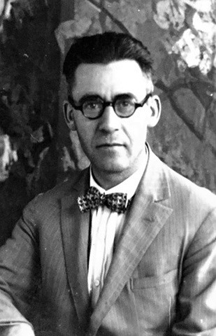
‘‘When the war broke out we fled from the enemy to France, where we were refugees for six years. During the period of the occupation by the enemy, we have fulfilled our patriotic duty entirely. My only son of twenty years old, was dead in the French Resistance for our freedom. Myself, resisting the Germans, I rendered my service to the Resistance. Losing our son, we are now completely alone, and we have to have the courage to start our life all over again.’’
Through the war archives in France (located in Caen) and the French departmental archives, I learned about the war history of Samuel’s household. They were interned in French concentration camps from late 1940 onwards. On August 26, 1942, they fled from a camp, located in a village called Chanac, and tried to go to Spain. Everything failed. Eventually, Samuel and his wife Stephanie were arrested, but their son, Georges Jakab, was not. Thanks to a letter in the French war archives, written in 1945 by the mayor of a village called Loudenvielle, I learned that Georges had a mountain accident in early 1943, which led to his drowning in the Lake of Pouchergues. This happened, according to the letter, while he tried to escape from the Germans to Spain. His body was found roughly six months later, in June 1943. When he died, his parents, Samuel and Stephanie, were still interned in the concentration camps. They both survived the war.
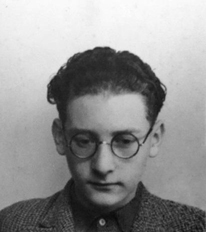
Like his sister Bertha, Samuel also immigrated to Canada. From his death certificate, I learned that Samuel killed himself in Victoria (British Columbia) in 1970 at age 81. The certificate notes his cause of death as ‘suicide by strangulation in the closet.’ This happened on the third anniversary of the death of his wife, Stephanie Rosenberg.
The Jakab siblings were once five. After the death of the young Gizella, four of them were left. Two were murdered during the war and one killed himself after the war. The only sibling who died of old age, was Bertha Simon-Jakab. She died in 1975 at age 87 in Montréal, Canada.
As the years passed, the different branches of the Jakab family lost contact to such an extent that no branch knew about any of the other branches. It was only last year that the connections were finally restored. The family has spread to several parts of the world, with members living in the USA, Israel, the Netherlands, France, Romania, and Belgium.
Thanks to JewishGen, I was able to find the
entry for David Jakab’s marriage of 1907. Also through JewishGen, I found Miki
Goldner, listed as a researcher of the Goldner family, which eventually led me
to the sole living descendant of David Jakab. The history of the siblings of
Ferdinand Jakab has now been discovered. May the memory of David, Bertha,
Samuel, Ferdinand, and Gizella be a blessing.
May 2020
Groningen, The Netherlands
This article is dedicated to Miki (Nikolai) Goldner, who died unexpectedly at age 70 on May 26, 2020, just prior to the publication of this article. He was a pleasant and funny person who was always very kind. May his memory be a blessing .
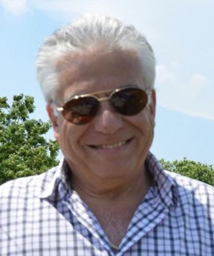
*Photos of Bertha Simon Jakab and Samuel Jakab courtesy of the State Archives in Brussels.
Research Notes and Hints
Reinier Heinsman made his first breakthrough when he discovered David Jakab’s marriage record in the JewishGen Hungary Database.
The marriage record revealed the name of David Jakab’s wife. Through the JewishGen Family Finder, Reinier connected with a relative of David Jakab’s wife. This connection yielded family trees, old photographs, and more connections. If you haven’t yet listed the surnames you are researching on Family Finder, we encourage you to do so.
Reinier connected with a friend of one of David Jakab’s descendants by finding her on Facebook. She led Reinier to David Jakab’s only living descendant.
Reinier was thorough in his research, using many different resources in addition to those listed above. Reinier provided this list of his key resources:
For Belgium:
Immigration archives for the city of Antwerp, called ”Felixarchief Antwerpen”. This archive is, for the most part, digitally available on the website: https://felixarchief.antwerpen.be/
The Archives of the Stranger Police (”Archives de la Police des Etrangers”). These Archives of foreigners/strangers are not digital. You can contact the Archives via the email address indicated on their website. http://www.arch.be/index.php?l=en&m=practical-information&r=our-reading-rooms&d=brussels
The Archive of War Victims in Brussels (”Archives des Victimes de la Guerre”).This archive contains personal files of many Jews who resided in Belgium during World War II. These Archives are not digital. You can contact the Archives via the email address indicated on their website. http://www.arch.be/index.php?l=en&m=practical-information&r=our-reading-rooms&d=aswv
Registrations of Jews living in Antwerp during the war (”The Municipal Jewish Register”), and mandatory membership cards of the Jewish Council of Jews living in Belgium during the war. For these archives, you can contact the Kazerne Dossin Museum via https://www.kazernedossin.eu/EN/
For France:
For information about the death of Samuel’s son, the French war archives were used, which are called: ”Archives des Victimes des Conflits Contemporains” (Archive of Victims of Contemporary Conflicts), which is located in Caen, France. http://www.servicehistorique.sga.defense.gouv.fr/en/node/32591
For information regarding French concentration camps, the archives are maintained on a departmental level. French concentration camp records are well preserved. For most French camps, the archive of the camp is located in the archives of the department in which the camp was located.
For Canada:
”Alex Dworkin Canadian Jewish Archives”. The files from URO (United Restitution Organization) and from HIAS (Hebrew Immigrant Aid Society) can be obtained through these archives. https://www.cjarchives.ca/en/
